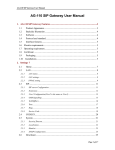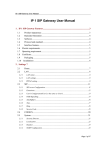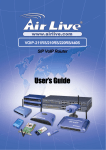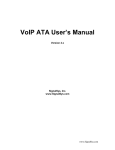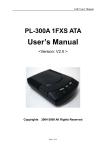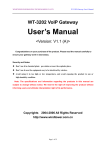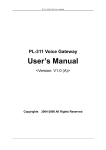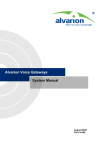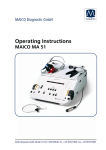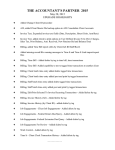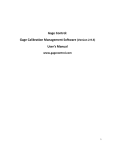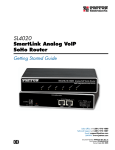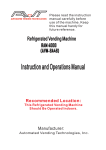Download AG-268 SIP user manual
Transcript
AG-268 SIP Gateway User Manual
AG-268 SIP Gateway User Manual
1.AG-268 SIP Gateway Features ...................................................................................3
1.1
1.2
1.3
1.4
1.5
1.6
1.7
1.8
1.9
Product Appearance ............................................................................................ 3
Backside Illustration ........................................................................................... 3
Electric Character................................................................................................ 4
Software .............................................................................................................. 4
Protocol and standard.......................................................................................... 4
Interface features................................................................................................. 4
operating environment ........................................................................................ 4
Packaging............................................................................................................ 5
Installations ......................................................................................................... 5
2.Settings .........................................................................................................................6
2.1
Home................................................................................................................... 6
2.2.1
WAN status ...................................................................................................................... 7
2.2.2
WAN settings ................................................................................................................... 8
2.2.3
WAN PPPoE Configuration ............................................................................................ 9
2.2.3
MAC Spoofing Configuration ....................................................................................... 10
2.3
LAN .................................................................................................................. 11
2.3.1
LAN status ..................................................................................................................... 11
2.3.2
LAN settings .................................................................................................................. 12
2.3.3
DHCP............................................................................................................................ 13
2.3.4
Port forwarding............................................................................................................. 14
2.4
SIP..................................................................................................................... 15
2.4.1
SIP server Configuration .............................................................................................. 15
2.4.2
Extensions ..................................................................................................................... 16
2.4.3
User1 Configuration(User2 is the same as User1) ....................................................... 17
2.4.4
OOB Signalling ............................................................................................................. 19
2.4.5
ToS/DiffServ .................................................................................................................. 20
2.4.6
Tone ............................................................................................................................... 21
2.4.7
Ring ............................................................................................................................... 22
2.4.8
Service Code ................................................................................................................. 23
2.5
2.6
2.6.1
CODECS........................................................................................................... 24
System............................................................................................................... 25
Security,Timeout............................................................................................................ 25
Page 1 of 37
AG-268 SIP Gateway User Manual
2.6.2
Localization................................................................................................................... 26
2.6.3
Handset ......................................................................................................................... 27
2.6.4
SNMP Configuration..................................................................................................... 28
2.7
2.7.1
2.8
2.8.1
2.9
Download.......................................................................................................... 29
Download ...................................................................................................................... 29
Configuration .................................................................................................... 30
Backup and restore settings........................................................................................... 30
Reset.................................................................................................................. 31
3.Restore to factory default..........................................................................................32
4.FAQ
.......................................................................................................................33
Q1
What is the default account of AG-268?........................................................... 33
Q2
Q3
Q4
Q5
Q6
Q7
Q8
Q9
Q10
How to use the IVR function of AG-268? ........................................................ 33
How can I know the IP address of AG-268?..................................................... 34
How to update AG-268 firmware?.................................................................... 35
How to use dial plan?........................................................................................ 35
How to use the value add service of AG-268?.................................................. 36
How to configure AG-268?............................................................................... 37
How to change AG-268 LAN port MAC address?........................................... 37
Why does my AG-268 always drop off from the server? ................................. 38
How to use the speed dial function? ................................................................ 38
Page 2 of 37
AG-268 SIP Gateway User Manual
1.
AG-268 SIP Gateway Features
1.1
Product Appearance
1.
2.
PWR:
SYS:
3.
4.
5.
WAN:
LAN:
TEL2:
TEL1:
6.
1.2
power status led.
Not registered in sip sever , flash 1 second and light 5
seconds ; registered, light off
WAN port status led
LAN port status led
Telephone status.
Telephone status.
Backside Illustration
1.
2.
PWR:
Reset:
3.
4.
WAN:
LAN:
5.
6.
TEL1:
TEL2:
Power Jack, 12V, 800mA
Please refer to “restore_to_factory_default” for the usage of this
button
10M/100M auto-negotiation, factory default is set to DHCP.
10M/100M auto-negotiation, initial IP is 192.168.1.1,and
enable DHCP service.
telephone1 interface.
telephone2 interface.
Page 3 of 37
AG-268 SIP Gateway User Manual
1.3
Electric Character
z Power adapter: 12V 800mA DC output
z Network interface: 2 x RJ-45 Ethernet Connectors
z FXS: 2 x FXS ports
1.4
Software
z
z
z
z
z
z
z
z
z
z
z
z
z
1.5
Protocol and standard
z
z
z
z
z
z
z
z
z
1.6
NAT supported
DHCP support for LAN or Cable modem
PPPoE support for ADSL or Cable modem
Configured by HTTP web browser
Support HTTP, TFTP upgrade.
Support major G.7XX (G711,G729,G723,G726) Codec
Dynamic voice jitter buffer, CNG (Comfort noise generation),VAD
G.165 compliant 16ms echo cancellation
Tone generation and Local DTMF re-generation according with ITU-T
E.164 dial plan and customized dial rules
Support T30/T38 FAX
Support adjustable user password and super password
IVR (Interactive Voice Response)
IEEE 802.3 /802.3 u 10 Base T / 100Base TX
Major G.7XX;
SIP RFC3261
TCP/IP: Internet transfer and control protocol
RTP: Real-time Transport Protocol
RTCP: Real-time Control Protocol
VAD/CNG save bandwidth
TFTP:
File Transfer protocol
HTTP:
Hyper Text Transfer protocol
Interface features
z WAN: 10M/100M auto-negotiation
z LAN: 10M/100M auto-negotiation
z FXS ports:
Line Feed Voltage: >=42V
Ring Voltage:
>=45V.
Ring Current:
>=30mA
1.7
operating environment
z Operation temperature: 0 to 50° C (32° to 122° F)
z Storage temperature: -30° to 65° C (-22° to 149° F)
Page 4 of 37
AG-268 SIP Gateway User Manual
z Humidity: 10 to 90% no dew.
1.8
Packaging
¾ Size:
22.5cm×17.0cm×7.6cm
¾ Packing list
9 AG-268 gateway X 1
9 Power adapter X 1
9 CD X 1
1.9
Installations
Connect the AG-268 LAN port and you computer with the RJ45 cable, and
then change your computer IP to static 192.168.1.xxx or use dynamic obtain IP,
type 192.168.1.1 in your IE browser to access AG-268 and change its setting.
Page 5 of 37
AG-268 SIP Gateway User Manual
2.
Settings
2.1
Home
1.
2.
3.
4.
5.
6.
7.
8.
System uptime:
NTP time:
LAN IP Address:
MAC Address:
system running time
NTP time and date
Gateway IP, factory default is192.168.1.1
Gateway MAC address,the same as LAN port
MAC address
Serial Number:
device serial number
Security:
password information
Application Code Version: firmware version
Downloader Code Version: downloader version
Page 6 of 37
AG-268 SIP Gateway User Manual
2.2
2.2.1
WAN
WAN status
1.
2.
3.
4.
5.
6.
7.
8.
9.
10.
11.
12.
Enable:
Yes indicates Wan port is ready for use
Service:
indicate use status of Wan port,”Route” or “Bridge”
Protocol:
Ethernet
Interface status: UP or Down
Link Status:
interface link mode
Dynamic IP Assignment: IP type
IP address:
WAN port IP address
MAC Address:
WAN port MAC address
Subnet Mask:
WAN port Subnet Mask
Default Gateway: Upper Gateway IP
DNS Address:
your local dynamic name server IP
Priority Tag:
Priority Tag value encoded in the Ethernet header in
outgoing packets.
13. Broadcast limit:
14. Multicast limit:
Page 7 of 37
AG-268 SIP Gateway User Manual
2.2.2
WAN settings
1. Device Operation Mode: WAN port mode, alternative “Bridged” and
“DHCP”
2. Obtain WAN configuration dynamically: use dynamic ip in WAN port
3. Specify fixed WAN configuration: manually enter the WAN port network
settings such as IP address, IP netmask, IP gateway, IP DNS server.
4. Broadcast limit: the value specifies the maximum limit on the percentage
of broadcast packets which will be bridged to the destination interface (as
a percentage of the source side bandwidth)
5. Multicast limit: the value specifies the maximum limit on the percentage of
multicast packets which will be bridged to the destination interface (as a
percentage of the source side bandwidth)
Page 8 of 37
AG-268 SIP Gateway User Manual
2.2.3
WAN PPPoE Configuration
1.
2.
3.
4.
Enable PPPoE:
use PPPoE to connect to the internet
Username&Password: PPP id and PPP pin from your ISP
Echo Timeout:
The duration between PPP echo requests
sending to server.
Echo Count:
The number of unanswered PPP echo
requests before PPP connection is closed.
Page 9 of 37
AG-268 SIP Gateway User Manual
2.2.3
MAC Spoofing Configuration
WAN MAC Address (Spoofed): you can change the WAN port IP address
here (not suggest)
Page 10 of 37
AG-268 SIP Gateway User Manual
2.3
LAN
2.3.1
LAN status
Interface Status:
1. Enable:
Yes indicate LAN id ready for use
2. Protocol:
Ethernet
3. Interface status: UP or Down
4. Link Status:
link speed mode
Network Settings:
5. IP address:
192.168.0.1
6. MAC Address:
7. Subnet Mask:
8. Default Gateway:
9. Domain Name:
10. Priority Tag:
LAN port IP address,factory default is
LAN port MAC address
LAN port subnet mask
default gate way IP
Domain
Priority Tag value encoded in the
Ethernet header in outgoing packets.
Page 11 of 37
AG-268 SIP Gateway User Manual
2.3.2
LAN settings
1. IP Address, Subnet Mask:
LAN port network settings.
2. Multicast Limits:
broadcast and multicast limitation.
3. PHY speed mode: LAN port speed mode.
Page 12 of 37
AG-268 SIP Gateway User Manual
2.3.3
DHCP
AG-268 router function setting.
Page 13 of 37
AG-268 SIP Gateway User Manual
2.3.4
Port forwarding
Port mapping settings.
Page 14 of 37
AG-268 SIP Gateway User Manual
2.4
SIP
2.4.1
SIP server Configuration
1. Primary Server:
Primary Server, AG-268 will auto switch to
Secondary server if primary server is unavailable.
2. Secondary Server: secondary server (back up function)
3. Address:
SIP server IP address
4. Port:
SIP server port,the well know port is 5060
5. Domain Name:
server domain
6. Send Registration Request with Expire Time:Register TTL (unit: seconds).
Indicate the register period, if AG-268 always log off after some time,please
set this time to a lower value.
7. Outbound Proxy IP: Outbound Proxy server IP address
8. Outbound Proxy Port: Outbound Proxy server port
RTP port Number Setting: RTP local port, the minimum value is 4
NAT Traversal
1. NONE:
2. UPnP:
3. Stun Server IP:
4. Stun Server Port:
disable NAT traversal
use UPnP,need the support of upper gateway
Fill in your stun server IP when using stun method
Fill in stun server port
Gateway Settings
Page 15 of 37
AG-268 SIP Gateway User Manual
1. Dial Plan: please refer to dial_plan
2. # use as a quick dial function: the number will send immediately after you
press the # button
3. To enable # to be recognized as dial number: use # as a dial number
4. * use as a quick dial function: the number will send immediately after you
press the * button
5. To enable * to be recognized as dial number: use * as a dial number
2.4.2
Extensions
SIP Extensions:
1. Support PRACK method with provisional response reliability: enable
SIP PRACK support
2. Encode SIP URI with user parameter: encode user=phone parameter in
SIP URI
3. Session Timer use UPDATE method: enable
SIP
session
timer
function。
Page 16 of 37
AG-268 SIP Gateway User Manual
4.
5.
6.
2.4.3
Enable Global Number support(E.164):
enable E.164 support。
Call Hold using c=0.0.0.0 (RFC 2543) in SDP:using the call hold method
described in RFC 2543. If unchecked, the call hold would follow RFC
3263 method
Send NOTIFY for REFER request:
send out NOTIFY request to
transfer for unattended and attended call transfer.
User1 Configuration(User2 is the same as User1)
Primary Server,Secondary Server
Phone Number: phone number.
CallerID Name: caller ID
Port Name: Local register port. (Note: please assign different port to
different user)
User Name: user name.
Password: password.
Line1 AEC Control: enable AEC (Acoustic Echo Cancellation) function, if
the other hear a significant echo, please check this option.
Line1 Gain Control:
Input Gain Control (-12 ~ 18) db:
Output Gain Control (-12 ~ 18) db:
input volume control.
output volume control.
Supplementary Service Subscription:
Enable Call Waiting (Reject second incoming call): enable call waiting.
Enable Caller ID:
enable caller ID display.
Page 17 of 37
AG-268 SIP Gateway User Manual
Reject anonymous: reject anonymous call.
Block Caller ID in outgoing call: use anonymous Caller ID.
Distinctive Ring Settings:
set distinctive ring to different user.
Speed Dial Setting:
speed dial number setting.
Page 18 of 37
AG-268 SIP Gateway User Manual
2.4.4
OOB Signalling
This sub-page allows configuration of the out-of-band signaling options for SIP.
Select whether OOB telephone event signaling is to be done using the SIP INFO
message, or to be done via RFC2833 RTP signaling. For additional information
please refer RFC2833.
Page 19 of 37
AG-268 SIP Gateway User Manual
2.4.5
ToS/DiffServ
This sub-page is used to configure the Type-of-Service/Diffserv byte values which
are to be used in the IP header of all transmitted SIP signaling packets and RTP
packets. The ToS/DiffServ byte values are entered as two-digit hexadecimal
values. If no special ToS/DiffServ value is to be used for a particular traffic type,
enter “00” or leave the setting empty.
Press “Save ToS/DiffServ Settings” to save these new settings.
Page 20 of 37
AG-268 SIP Gateway User Manual
2.4.6
Tone
Set AG-268 ring tone for different region.
Page 21 of 37
AG-268 SIP Gateway User Manual
2.4.7
Ring
Set different user’s ring tone, co-work with “SIPÆUserÆDistinctive Ring Settings”
Page 22 of 37
AG-268 SIP Gateway User Manual
2.4.8
Service Code
Please refer to value_add_service for the use of service code.
Page 23 of 37
AG-268 SIP Gateway User Manual
2.5
CODECS
CODECS:
Support CODEC: G711U、G711A、G723、G726、G729。
Silence Suppression: enable VAD.
Packetization:
Configure the packet sending increments
Jitter Buffer
configure the timing of the voice buffering.
Selection between adaptive or fixed jitter buffer. Default = ADAPTIVE
Set the adaptive jitter buffer maximum playout delay. Default = 100ms
or Fixed jitter buffer playout delay. Default = 40ms
Whether or not to automatically switch from an adaptive jitter buffer to a
fixed jitter buffer upon fax/modem tone detection
Click on “Save CODEC Configuration” to save the configurations made.
Page 24 of 37
AG-268 SIP Gateway User Manual
2.6
System
2.6.1
Security,Timeout
Setting web security and authentication timeout
Page 25 of 37
AG-268 SIP Gateway User Manual
2.6.2
Localization
Choose the correct country for a proper impedance match, as well as the NTP
Server, and Time Zone. Check the “Adjust clock for daylight savings”, when
applicable.
Click on “Save Localization Settings”, to save your configurations.
Page 26 of 37
AG-268 SIP Gateway User Manual
2.6.3
Handset
Hook Flash timing setting
Hook Flash Timer Min: minimum available time,unit: ms。
Hook Flash Timer Max: maximum available time,unit: ms。
When you press the flash during the time range you set, your action will act as
hold function, and otherwise it will act as the hang up function. In some application,
user wants to call another people immediately after he put down the handset, he
can set the hook flash timer during the range: 10ms~20ms
Page 27 of 37
AG-268 SIP Gateway User Manual
2.6.4
SNMP Configuration
SNMP Trap Configuration
IP address:
Trap host IP address
Trap Community:
The community name used by the SNMP manager to
verify traps. The default value is ‘public’
SNMP Community Configuration
Read Community:
The community name used by the SNMP manager when
reading SNMP data items from a client MIB. The default
value is ‘public’
Write Community:
The community name used by the SNMP manager when
setting SNMP data items in a client’s MIB. The default
value is ‘public’
SNMP Community Configuration
System Description: Description of the unit (e.g. “John’s phone”)
System Object Id:
A vendor’s enterprise ID
Page 28 of 37
AG-268 SIP Gateway User Manual
2.7
Download
2.7.1
Download
For both HTTP and TFTP methods, the device will reboot itself into the
downloader mode if the main application is executing, and proceed with the ROM
file download and permanent write of the application to the device’s flash memory.
After the download is completed, the download status page will be displayed.
Note: The available upgrade firmware is in .r0 extension; make sure you use the
correct firmware before you update the firmware.
Page 29 of 37
AG-268 SIP Gateway User Manual
2.8
Configuration
2.8.1
Backup and restore settings
Back up and restore the configure files.
30
AG-268 SIP Gateway User Manual
2.9
Reset
AG-268 will save the current settings and reset by clicking the “reset” button
31
AG-268 SIP Gateway User Manual
3.
Restore to factory default
If your AG-268 settings is in chaos or you can’t get the AG-268 IP to access it,
you can reset the device to factory default:
a) Power off
b) Press reset button and power on
c) The PWR led will light ÆThen PWR , SYS, WAN and LAN led will blinkÆ
Then the PWR and SYS led light.
d) Release the reset button after about 15~20 seconds,
e) The PWR, SYS, WAN and LAN led will blink for a while and then the PWR
and SYS led will light.
AG-268 will be reset to factory default after the above procedure, you can
then access AG-268 through its LAN port, please refer to access_AG268 for
details.
32
AG-268 SIP Gateway User Manual
4.
FAQ
Q1
What is the default account of AG-268?
A1:
The default account is:
Administrator: user name: admin
User:
user name: user
Q2
password: voip;
password: voip
How to use the IVR function of AG-268?
A2:
The IVR function is record in G729 codec, so you have to choose G729 codec to
active the IVR.
You can use IVR function to observe and set the WAN port network parameters
pick up the handset and dial **** to enter IVR mode。
Key
Function
**** nter main menu
100# eck network state
110#
DHCP Settings
120#
130#
140#
Input
Submenu
1#
Enable DHCP function
2#
Disable DHCP function
or# back to main menu
Static IP address
Use “*” replace “.”, and “#” as end.
Settings
For example: 172*16*230*227#
or # back to main menu
Gateway IP settings Use “*” replace “.”, and “#” as end.
For example: 172*16*230*1#
or # back to main menu
Subnet mask settings Use “*” replace “.”, and “#” as end.
For example: 255*255*255*255#
or # back to main menu
33
AG-268 SIP Gateway User Manual
Q3
How can I know the IP address of AG-268?
A3:
you can use the following methods to obtain AG-268’s IP :
1.
Use IVR function;
2.
3.
i.
ii.
Observe the IP from the upper gateway;
Use the DHCP assignment function of AG-268
Reset AG-268 to factory_default ,
Directly connect your computer and AG-268’ LAN port,
Set your computer to dynamic obtain IP,
Use command “ipconfig” to view your computer network status, and
the gateway IP is the AG-268 LAN port IP. It is 192.168.1.1 in this
case.
iii.
iv.
v.
Then you can use this IP address to access AG-268 through its LAN
port the default account is admin/voip
34
AG-268 SIP Gateway User Manual
Q4
How to update AG-268 firmware?
A4: Go to DownloadÆDownload, press “browse” in the http download
method,and choose the correct firmware file (a 1.5M file in .r0 extension),and
press the “Start HTTP Download” to perform updating。
Q5
How to use dial plan?
A5:
A dial plan gives the unit a map to determine when a complete number has been
entered and should be passed to the gatekeeper for resolution into an IP address.
Dial plans are expressed using the same syntax as used by MGCP NCS
specification.
The formal syntax of the dial plan is described by the following notation:
Digit ::= "0" | "1" | "2" | "3" | "4" | "5" | "6" | "7" | "8" | "9"
Timer ::= "T" | "t"
Letter ::= Digit | Timer | "#" | "*" | "A" | "a" | "B" | "b" | "C" | "c"| "D" | "d"
Range ::= "X" | "x" -- matches any digit
| "[" Letters "]" -- matches any of the specified letters
Letters::= Subrange | Subrange Letters
Subrange::= Letter -- matches the specified letter
| Digit "-" Digit -- matches any digit between first and last
Position::= Letter | Range
StringElement::= Position -- matches any occurrence of the position
| Position "." -- matches an arbitrary number of occurrences
including 0
String ::= StringElement | StringElement String
StringList::= String | String "|" StringList
DialPlan::= String | "(" StringList ")"
A dial plan, according to this syntax, is defined either by a (case insensitive) string
or by a list of strings. Regardless of the above syntax a timer is only allowed if it
appears in the last position in a string (12T3 is not valid). Each string is an
alternate numbering scheme. The unit will process the dial plan by comparing the
current dial string against the dial plan, if the result is underqualified (partial
matches at least one entry) then it will do nothing further. If the result matches or
is over-qualified (no further digits could possibly produce a match) then send the
string to the gatekeeper and clear the dial string. The Timer T is activated when it
is all that is required to produce a match. The period of timer T is 4 seconds. For
example a dial plan of (xxxT|xxxxx) will match immediately if 5 digits are entered,
it will also match after a 4 second pause when 3 digits are entered.
35
AG-468 SIP 协议网关使用手册
Simple Dial Plan
Allows dialing of 7 digit numbers (e.g. 5551234) or an operator on 0. Dial plan
is (0T|xxxxxxx)
Complex Dial Plan
Local operator on 0, long distance operator on 00, four digit local extension
number starting with 3,4 or 5, seven digit local numbers are prefixed by an 8,
two digit star services (e.g. 69), ten digit long distance prefixed by 91, and
international numbers starting with 9011+variable number of digits.
Dial plan for this is:
(0T|00T|[3-5]xxx|8xxxxxxx|*xx|91xxxxxxxxxx|9011x.T)
Q6
How to use the value add service of AG-268?
You need to set the service code for using the AG-268 value add service. For
example, I set the service code as the above picture。
Condition Call Forwarding: (the call will transfer if no one answer)
a) Set forwarding number:
pick up the handsetÆpress *70# Æthen
you will hear the dial toneÆpress the forwarding numberÆthen you will
here three beeps indicating setting finish。
b) Set the timeout:
go to the “sip extensionsÆConditional call
Forwarding timer” and set the timeout before forwarding,unit: second,
and then active this option.
c) Then the call will automatically transfer to the forwarding number if no
36
AG-468 SIP 协议网关使用手册
one answers the call in the timeout.
Call Forwarding: (forwarding always)
a) Enable call forwarding: pick up the handsetÆpress *72# Æthen you
will hear the dial toneÆpress the forwarding numberÆthen you will here
three beeps indicating setting finish, then all incoming call will forward to
this number automatically。
b) Disable call forwarding: pick up the handset Æ press #72# Æthen you
will here three beeps indicating setting finish
Do not disturb: (DND)
a) Enable DND:
pick up the handset Æ press *74# Æthen you will here
three beeps indicating setting finishÆthen the phone won’t ringing when
there is an incoming call。
b) Disable DND: pick up the handset Æ press #74# Æthen you will here
three beeps indicating setting finish
Call transfer:
a) Unattended transfer: A call BÆB press *98# and then enter C
numberÆthen B will hear three beeps indicating the transfer
successfully。
b) Attended transfer: A calls BÆB push the hook flash to hold AÆB then
dial C number to talk with C Æ then B press *98# to transfer the
callÆthen A can talk with C。
Call Return:
Pick up the handset Æand then press *69# to dial the latest received call
3 way conference call:
A calls and talks with B Æ B push the hook flash to hold A B then dial C
number to talk with C ÆB then push the hook flash again to enable three
way conference callÆ C will leave the call is B push the hook-flash again.
Q7
How to configure AG-268?
A7
please refer to “AG-268 quick start guide”
Q8
How to change AG-268 LAN port MAC address?
A8
please access http://AG-268ip/burn.htm and change the MAC address,
37
AG-468 SIP 协议网关使用手册
after you have changed it, clap the reset button to save your setting.
Q9
Why does my AG-268 always drop off from the server?
A9
You can find the register TTL in the “SIPÆserverÆ Send Registration Request
with Expire Time”, if this time is longer then the system require register time,
AG-268 will always drop off from the server, please set this time to a suitable
value, (unit: seconds).
Q10
How to use the speed dial function?
A10
You need to set the speed dial number in the “SIPÆUserÆ Speed Dial
Settings”, and then set the operation code in the “ServerÆService Code”, for
example *68, then you can dial *681 to replace the speed dial number in the
speed dial settings.
38






































